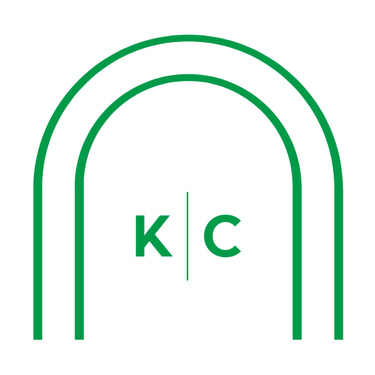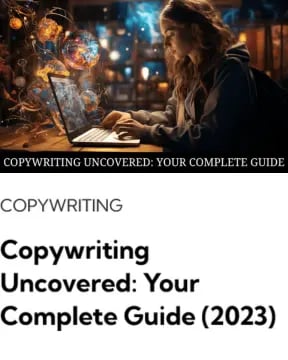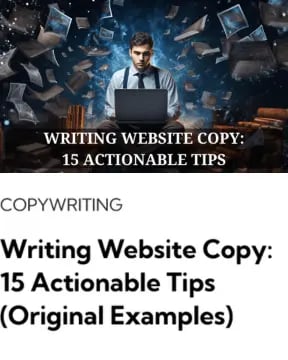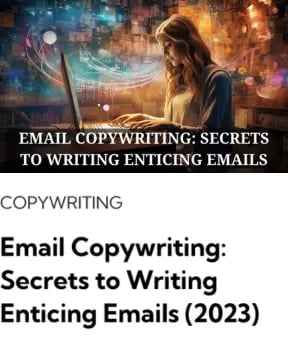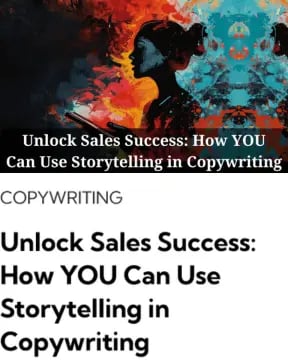8 Proven Copywriting Frameworks for More Sales
These 8 proven copywriting frameworks will help you boost sales. Craft compelling content that drives conversions and increases your revenue.
COPYWRITING




Shane Curry
1. AIDA (Attention, Interest, Desire, Action)
AIDA is one of the most popular copywriting frameworks.
Attention
Capturing attention is the first step. Use compelling headlines, intriguing opening sentences, or eye-catching visuals. Think of it as the hook that draws readers in.
On average, website visitors spend 5.59 seconds reading content on a site. That’s how much time you have to grab attention on average.
Maybe you immediately noticed I left out an introduction here - although everyone usually includes one.
I left it out deliberately as a pattern interruption tactic to catch your attention.
And intros are usually pointless anyway.
Interest
Building interest follows capturing attention. Highlight the benefits of your product or service.
Use a unique selling proposition or share a compelling story.
Say you’re in the health industry and selling a nutrition plan. Focus on what makes your plan different from the 1000s of others.
Desire
Creating desire involves making the reader want your product. Emphasise benefits, create urgency or use social proof.
Testimonials and case studies work well here. You can show how someone transformed themselves with your nutrition plan.
Or ask someone to give a review for your website. A report by BrightLocal says that 87% of consumers read online reviews for local businesses.
Action
Prompting action is the final step. Your call to action should be clear, compelling, and easy to follow.
Use active language like "Get Started Now" or "Start Healthy Eating."
2. PAS (Problem, Agitate, Solution)
PAS is one of the simplest yet most effective copywriting frameworks.
Problem
Identify the target audience's problem. The more specific, the better.
Say you're selling cybersecurity software. Use statistics to highlight the prevalence of data breaches.
For instance, a data breach recently affected 13 million people in Australia. You could use this in your content.
“Australia’s population is 26 million. A single data breach recently impacted 13 million people - half of the population.”
Agitate
Agitate by emphasising the consequences of not solving the problem. Discuss potential problems like identity theft or revenue loss.
This step is about making the reader uncomfortable enough to seek a solution.
“Chances are it’ll happen again. Failing to protect yourself leaves you vulnerable. Hackers can sell your private information on the dark web, steal your identity, or access your savings accounts.”
Solution
Offer a solution to the problem. Explain how your product or service addresses the issue. Highlight key features and benefits.
“Our cybersecurity software protects you against current and future data breaches. It immediately alerts you of any risks to your private information. Keep your details out of sight and your future bright.”
3. The 4P's Formula (Picture, Promise, Prove, Push)
Picture
Paint a vivid picture of the benefits. Use descriptive language to make the reader visualise success.
Say you're selling fitness equipment to new mums. Help them picture how they’ll feel more energetic and fit.
“Carry your baby without getting sore and tired.”
Promise
Make a promise about what the product can deliver. Make it specific, realistic and achievable.
"Strengthen your abs in 60 days after giving birth."
Prove
Provide evidence or testimonials to back up your promise. Use data, case studies and customer reviews.
According to a study by Spiegel Research Center, displaying reviews can increase conversion rates by up to 270%.
“Here’s what other new mums have to say…”
Push
Encourage the reader to take action. Use phrases like…
"Get Stronger Today."
You might also offer a “60-day money-back guarantee.”
This reduces buying friction and makes it easier for them to follow through.
4. FAB (Features, Advantages, Benefits)
Features
List the features of your product. Be specific.
For example, if you’re selling software, mention features like "real-time analytics" or "customisable dashboards."
Advantages
Explain how these features provide advantages. For instance, real-time analytics helps you make data-driven decisions quickly.
Benefits
Highlight the benefits of these advantages. In the case of real-time analytics, the benefits could be "strategic decision-making and increased productivity."
5. The 5 C's of Copywriting
Clear
Make your copy clear and easy to understand. Avoid jargon and use simple language.
Confusing readers is bad for business. People unclear on your offer won’t buy from you.
Concise
Keep your copy concise and to the point. Respect your reader’s time.
And give yourself the best chance to convert them.
On average, people spend 54 seconds on a single page.
You don’t have much time to persuade them to buy. So get to the point.
Compelling
Make your copy compelling. Use strong verbs and active voice.
What’s better?
"We boost sales by at least 50%."
OR
"Sales will be boosted by us by at least 50%."
Credible
Establish credibility through evidence and testimonials. Include stats and quotes from reputable sources.
Show data on the results you get for other customers. Display the info in charts or graphs to make it easily digestible.
Consistent
Maintain a consistent tone and style throughout your copy. Consistency builds trust and reinforces your brand identity.
6. The StoryBrand Framework
A Character
Introduce a character your audience can identify with. This character should mirror their challenges and aspirations.
Think of this character as your Luke Skywalker or Bilbo Baggins.
Has a Problem
Present a problem that the character faces. Be specific.
For instance, a keynote speaker struggling to get website traffic.
Meets a Guide
Introduce a guide who can help solve the problem. This guide is your brand or product.
Think of the guide as your Obi-Wan Kenobi or Gandalf.
Who Gives Them a Plan
Provide a clear plan to solve the problem. Break it down into actionable steps.
For example:
Technical SEO
On-page SEO
Local SEO
Content creation
Internal linking
Backlinks
Calls Them to Action
Encourage the character to take action. Use clear, direct calls to action.
That Helps Them Avoid Failure
Highlight the consequences of not taking action. This adds urgency.
And Ends in a Success
Show the success that comes from taking action. Use testimonials or case studies to illustrate this.
7. SLAP (Stop, Look, Act, Purchase)
Stop
Grab the reader’s attention. Use bold headlines or striking images.
Look
Make the reader look at your product or service. Use engaging visuals or compelling stats.
Act
Encourage the reader to take action. Use strong calls to action.
Purchase
Prompt the reader to make a purchase. Make the buying process straightforward.
8. BAB (Before-After-Bridge)
The BAB copywriting framework is popular in the health and fitness industry. But you can use it for any niche.
Before
Describe the current situation or problem. Be vivid.
"Last year, Jim couldn’t walk up a flight of stairs."
After
Paint a picture of the desired outcome.
"This month, he’s running up 100 floors for charity."
Bridge
Provide a solution that bridges the gap between the before and after states.
"We challenge you to change your life with our 26-week fitness challenge."
Understanding Copywriting Frameworks
Copywriting frameworks offer you a structured approach or template. They guide you and help you craft persuasive and effective content.
You get a proven outline for:
Organising ideas
Addressing audience needs
Achieving specific communication goals
Using a structured approach means your content is more engaging and aligns better with your marketing objectives.
Benefits of Using Copywriting Frameworks
Streamlined Writing
Using a copywriting framework can significantly streamline the writing process. It gives you a roadmap.
You can organise your thoughts and cover all the necessary points. This saves time and reduces your cognitive load, allowing you to focus on conveying the benefits of your product.
Increased Effectiveness
A well-chosen framework can make your copy more persuasive and effective. Following a tried-and-tested structure helps you engage your audience and communicate the best aspects of your business.
Proven Results
In the right hands, these frameworks have generated billions of dollars in sales. The structures have been tested and proven effective, increasing your likelihood of success.
Clear Messaging
A structured framework helps you organise thoughts and ideas, meaning you can write more clearly. This makes the copy easier to follow for your audience and ultimately more persuasive.
Improved Conversions
These frameworks follow established patterns of persuasive writing. Using them properly will lead to higher conversion rates and sales.
As business owners, we all want to convert more customers at the end of the day.
Too busy to implement these copywriting tips?
Our free homepage copy audit can help.
We check your copy and make suggestions to maximise conversions.
